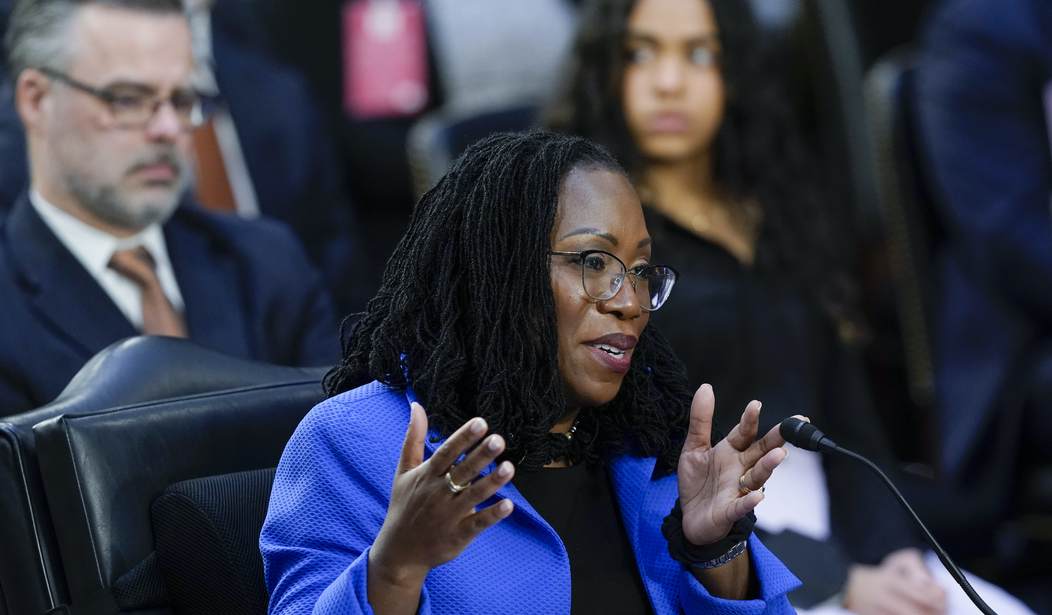During her confirmation hearing on Tuesday night, Judge Ketanji Brown Jackson gave a particularly memorable response, as Spencer highlighted, to Sen. Marsha Blackburn's (R-TN) question asking "Can you provide a definition for the word woman?" The nominee could not, citing it's because she's "not a biologist." Judge Jackson has stuck to that absurd answer throughout Wednesday's hearings as well, including when it comes to the issue of abortion.
Judge Jackson is asked whether an 20-week-old unborn child can survive outside of the womb:
— Townhall.com (@townhallcom) March 23, 2022
"I'm not a biologist. I haven't studied this. I don't know." pic.twitter.com/8rsk3vD9fX
During a back-and-forth between Sen. John Cornyn (R-TX), about whether an unborn child can live independently of its mother outside of the womb, Judge Jackson stuck to such a line as "I'm not a biologist," going on to say "I haven't studied this. I don't know."
She did respond that "what I know is that the Supreme Court has tests and standards that it's applied when it evaluates regulation of the right of a woman to terminate their pregnancy."
One does not need to be a biologist to look up and find out that viability--when the child can survive outside of the womb--is considered to be around 23 to 24 weeks. Even The New York Times is admitting this.
Further, as Carole Novielli laid out in an article for Live Action News of last August, legal experts have weighed in on the issue of viability, to offer insight into how the issue was decided as more so of a political issue than a medical one. Viability is one of those "tests and standards" that the justices came up with when they legalized abortion on demand in all 50 states in the 1973 decision of Roe v. Wade.
Recommended
The Court may ultimately overturn Roe, and soon. The justices heard oral arguments last December for Dobbs v. Jackson, which examines the constitutionality of pre-viability abortion bans. A decision is expected in June.
Senator Graham: “Can an unborn child feel pain at 20 weeks?”
— Townhall.com (@townhallcom) March 23, 2022
Judge Jackson: “I don’t know.” pic.twitter.com/MrB1cl9LDF
During Sen. Lindsey Graham's (R-SC) line of questioning on Wednesday, he had asked Judge Jackson "can an unborn child feel pain at 20 weeks," to which Judge Jackson replied "I don't know." She similarly did not know that an unborn child is given anesthesia if there is surgery provided in utero.
The senator pointed out to Judge Jackson that "well that may come before you one day, so just keep an open mind."
Graham has introduced the Pain-Capable Unborn Child Protection Act for multiple sessions of Congress, which would outlaw abortion past 20-weeks at the federal level, based on the scientific evidence that unborn children can feel pain by this stage of pregnancy. Even in the years where it has passed the U.S. House of Representatives and received a majority of support from the U.S. Senate, it has failed to overcome the filibuster, due to pro-abortion Democrats in the Senate.
That evidence is available on the Internet, in the form of studies and doctor testimonies. Again, one does not need to be a biologist to find this.
Dr. David Prenctice, vice president and director of research at the Charlotte Lozier Institute (CLI), quickly responded to set the record straight. Emphasis is original:
“Judge Jackson is educated in the law, not science, but the correct answer is ‘yes.’ The idea that unborn babies don’t feel pain is rooted in a different era when newborns were strapped down and operated on without anesthesia or pain relief. Thankfully, neither science nor humanity have stood still in the 50 years since Roe v. Wade.
“Unborn babies do feel pain. We can actually see this via high-resolution ultrasound during in-utero medical injections when the unborn baby cries and grimaces and squirms just like other kids when they get a shot at the doctor’s office. It’s why fetal anesthesia is now routine and recommended for all surgeries starting at 14 weeks’ gestation.
“Science continues to advance. We encourage the Supreme Court and Judge Jackson to catch up.”
It's especially worth highlighting a study from Stuart WG Derbyshire and John C. Bockmann, "Reconsidering fetal pain." After previously co-authoring studies against fetal pain, Derbyshire in this 2020 study acknowledged that fetal pain may be felt as early as 12-weeks.
Dr. Bockmann also published "The ACOG Should Reconsider Fetal Pain" for CLI last August.
Also on the issue of abortion, as Spencer covered, Sen. John Kennedy (R-LA) similarly stumped Judge Jackson on Tuesday night when it comes to not just "when life begins" but also "when does equal protection of the laws attach to a human being?"
When it comes to when life begins, an article by Steve Jacobs for Quillette from October 2019 found that 96 percent of biologists agreed that it begins at conception.

























Join the conversation as a VIP Member